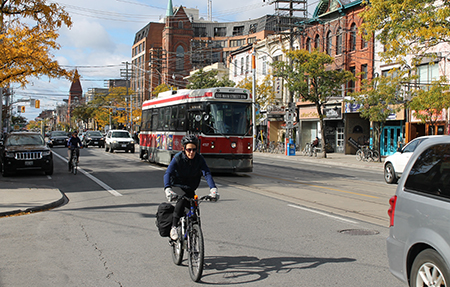 One-third of bike crashes in Toronto’s downtown involved the city’s streetcar tracks, according to a new study out of UBC and Ryerson University that suggests that separated bike routes could reduce risk to cyclists.
One-third of bike crashes in Toronto’s downtown involved the city’s streetcar tracks, according to a new study out of UBC and Ryerson University that suggests that separated bike routes could reduce risk to cyclists.
The findings, published in July in BMC Public Health, could help inform planning decisions in cities building or expanding light-rail systems similar to Toronto’s streetcar network including Surrey, Hamilton, Ottawa, Seattle and Portland.
“This would be a great time to create separated bike and rail lanes,” said Kay Teschke, Professor in UBC’s School of Population and Public Health. “Physically separated lanes are a wonderful way for two environmentally-friendly modes of transportation to run safely together.”
The researchers examined 276 bike crashes that sent people to hospital in Toronto’s downtown core between May 2008 and November 2009. Toronto’s streetcar network runs through the city’s downtown and the tracks stretch along many busy streets and intersections. The researchers found that 139 of the crashes occurred in areas with streetcar tracks and 87 directly involved the tracks. In these crashes, cyclists often had to maneuver quickly to avoid collisions with vehicles, pedestrians or other cyclists and their wheels got caught in the gap alongside the rails (called the flangeway) or slipped on the rail itself.
 “Riding as a cyclist in Toronto you always feel that streetcar tracks are a hazard, and we all have our near misses, but our study is one of the first to put a number to this risk,” said Anne Harris, assistant professor in the school of occupational and public health at Ryerson University. “The fact that about a third of the Toronto bike injuries in our study involved streetcar tracks really underlined the danger to me.”
“Riding as a cyclist in Toronto you always feel that streetcar tracks are a hazard, and we all have our near misses, but our study is one of the first to put a number to this risk,” said Anne Harris, assistant professor in the school of occupational and public health at Ryerson University. “The fact that about a third of the Toronto bike injuries in our study involved streetcar tracks really underlined the danger to me.”
The researchers examined factors that might contribute to the crashes. They found streets with tracks and parked cars to be particularly dangerous, as were left turns at intersections with tracks. They also found that tires of many commonly sold bikes are narrower than the smallest track flangeways.
The authors argue the best way to make cities safer for cyclists in Toronto and other cities planning for light-rail is to create separated bike lanes that minimize interaction with rail tracks.